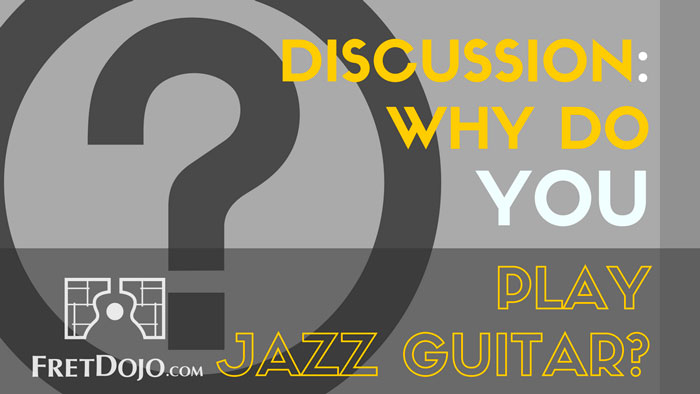
I’ve been asked a lot lately if I have any tips for dealing with performance anxiety when playing music in a live concert setting. I consider myself to be rather qualified to provide some thoughts on this subject :)
Over the years I have struggled a lot with nerves during performances, which led me on a journey of contemplating the issue and testing a variety of strategies to see if they would work.
This article outlines some mindset shifts and techniques that have worked very well for me personally to reduce anxiety on stage.
“The only thing we have to fear is fear itself.”
~ Franklin D. Roosevelt
It is very important if you do suffer from performance anxiety to address the issue, as it impacts your own enjoyment of playing music live, and (more importantly) detracts from the audience’s enjoyment of the show.
I have seen musicians whose careers have been terminated by performance anxiety, so it is essential to develop strategies that you know are reliable in combating this problem.
So what is performance anxiety exactly?
Performance anxiety is basically a form of fear. Fear of the unknown. Fear of being judged. Fear of failure. Fear that the audience won’t like it.
And where does this fear arise?
From a distorted perception of the situation. An idea that a performance needs to be perfect to be acceptable to an audience.
Perfectionism is rampant among musicians. The problem is if you expect something to be perfect then you will never be satisfied with how you play, as nothing can be perfect in this world and theoretically could always be better. It’s kind of like trying to find the end of a rainbow.
Making mistakes…correctly
And anyway, what makes a performance truly great?
I have attended some really technically near perfect performances over the years, however I found the majority of these concerts to be very boring.
A true musical communication with your audience is not on whether you play the notes perfectly; it is whether you play your music authentically, generously and from your heart space, remaining in the present moment.
People coming to a concert really want to see someone totally in the moment and enjoying themselves, not someone stressed out that a note in the third bar was slightly buzzy or out of tune.
Let’s think about making mistakes for a moment.
This is usually what happens when an anxious performer makes a mistake in the performance:
Musician (thinking whilst still playing):
“Oh man, I can’t believe I did that. I got that note perfectly right in every single rehearsal. I can’t believe you have played this 300 times and yet and the critical moment you blew it. What the heck is wrong with you??” etc etc.
Do you see what is likely to happen in this scenario?
The performer is so obsessed with this tiny mistake (that the audience probably didn’t even notice) that his concentration and focus has totally moved away from what he is supposed to be doing – focussing on playing the music, enjoying himself and communicating to the audience. Ironically, this will probably result in more mistakes!
A vicious cycle, indeed.
Meditation practice is the key
So the above scenario is a result of the inability of a performer being able to keep his mind in the present moment, regardless of any unexpected occurrences, such as mistakes. This is the primary cause of performance anxiety.
It is the mind straying away from the present into the past (i.e. obsessing about mistakes that one has already done) or into the future (worrying about a difficult passage or imagining terrible things that might happen in the performance).
These can both occur on the concert stage itself or in the leadup to a performance – thinking about a past negative experience one has had on stage and/or worrying about how the upcoming concert is going to go.
How does one train oneself to keep the mind in the present moment, and avoid falling into unhelpful mental states?
By learning the practice of meditation.
Meditation is a very simple technique to train the mind to not stray into the past or future and the associated negative states that can occur when one does this. It is very straightforward to learn and one does not need to be a religious person to practice it.
Meditation brings the most benefit when one gets into a routine of practicing daily. I myself have considered it a crucial element to overcome performance anxiety.
How to meditate
Sit in a comfortable position, either on a chair or cross legged on the floor. Close your eyes or better still leave them slightly open, just gently staring into the space in front of you.
For a little while, say 5 minutes, move your focus around the body, from the feet, to the legs, up through the back, to the head and down again. The most important part of the posture is that your back is straight but relaxed.
Then, for another 5 minutes, focus one’s awareness on your breathing, with the breath moving through the nostrils. Watch your breath naturally flowing in and out.
The only rule is: whenever you notice your mind wandering away to any distractions, whether external noises or internal distractions like any thoughts, don’t push them away but merely bring your awareness back to the breath.
Simple!
This will train the mind to better manage distractions during a performance on stage.
The important thing is to realize that you will probably continue to have distracting, negative thoughts in performance, but you will now have a reliable method to simply leave them be, put those thoughts aside and move your focus back to where it is supposed to be, on focussing on the music.
Further Resources
There is a very good article by Leo Barbatua from the highly acclaimed blog Zen Habits that gives another good explanation of how to meditate that you can find by clicking here: http://zenhabits.net/meditation-for-beginners/
Dr. Jon Kabat-Zinn developed the Mindfulness Based Stress Reduction (MBSR) program at the University of Massachusetts Medical Center. He has recorded an excellent CD of guided meditations that you can find here.
If you are struggling with performance anxiety right now, I hope that this article has helped you out and given you some ideas for managing this very prevalent issue among musicians and performers.
Check out my Twitter feed at @gregoguitar to get more thoughts and tips on how to get your playing to the next level, or subscribe to this blog so you know when the next articles and videos are coming out. Happy performing!


Excelent post! I’m finally meditating regularly, mostly with the help of a gadget called Muse.
I’m a bit of a nerd, so needed numbers, quantifiable results etc. In short, I needed something telling me regularly that I was doing this correctly, to counter the negative voice in my head. Being focused on results runs counter to what every meditation teacher says, to just do it and not think about outcomes. But, at least for me, some digital feedback was helpful in establishing and maintaining regular practice.
I can’t say that meditation helped my stage fright yet but I remain hopeful that it will.
More generally, I think meditation is helpful for reasons beyond stage fright, given that musicians have chosen a non-traditional and little understood career path. We’re reminded daily that hey, life would be easier if we just became accountants or sold houses. :) In the US, add lack of healthcare coverage to the list of possible stressors. We’re on the margins in many ways, unless we’re extremely lucky on the business side of “music business”.
Also, according to a recent study, something like 60% of touring musicians struggle with mental health issues.
http://www.musictimes.com/articles/42280/20150705/study-suggests-60-percent-touring-musicians-suffer-mental-health-issues.htm
So, there are many great reasons to come to know your own mind more intimately!
Thank you for this…
Hello Greg, and hello to all the fellow students at the Dojo. I know what is being spoken about. I had this problem for years.
It was so bad that I stopped playing before an audience. Now I’ve discovered that I was playing music in a mechanical way, rather than in a musical way. Since I’m singing along internally, it is much better now. I think the singing is a kind of assistance to the concentration.
greetings from Germany
Ron
Hi Ron, hello from Australia! Great to hear that you overcame this issue, yes performance anxiety can be crippling for many musicians and other performing artists.
Funny you mentioned that about the singing as I have been thinking along those lines too recently. I’ve been working on moving my focus away from the technical aspects of playing in a performance situation and simply thinking about my playing in purely musical terms. You are right, this does help a great deal. If your instrument is simply doing what you are ‘singing’ internally what seems tricky technically seems to just flow and work as it should. Great comment, thanks for sharing!
The following may be of interest in this context: https://bulletproofmusician.com/
My worstill struggle to record myself, even when I know no one will hear it.st experience with stage fright occurred when I was giving a concert and the host asked if she could tape it. Unthinkingly, I said yes. From that moment on, the awareness that every mistake would be preserved forever overwhelmed me. I could barely play. Everything was horrible. I still struggle to record myself, even when I know no one will hear it.
I also struggle with recording! Live just feels right, and recording makes me so self-conscious. I think it is a good idea to start recording yourself at home a lot. Like a little every day. Until you get used to it. An exposure therapy.
I agree Sara, it’s desensitization. I usually get fed up more than anxious when I’ve had to repeat the recording often to get a decent take.
Beside positive thoughts, I think that deep breaths also helps reduce anxiety.
I totally agree with you Sara. I always had a great time playing on stage. No anxiety.
Recording myself creates stress often, because you want it musically perfect and because it will be seen by others. Meditation techniques work by making you mindful and focused so you can play creatively with your own sound, not trying to sound like someone else.
AV Recording in the practice room more often reduces the stress and gives you feedback to make any adjustments you may want.
I’ve been meditation for 33 years now.
Thank you for this article!!! Struggling to get the courage up to play at an open mic and this helped!
i have been practicing sahaja yoga meditation works ok for 30years
Here is what will free me up ???? n the future, and allow me to to go outside and play what I feel.
“A true musical communication with your audience is not on whether you play the notes perfectly; it is whether you play your music authentically, generously and from your heart space, remaining in the present moment.
People coming to a concert really want to see someone totally in the moment and enjoying themselves, not someone stressed out that a note in the third bar was slightly buzzy or out of tune.”
Understanding the above except from the article gives me freedom to express. Whatever is in the performer, that’s what needs to come out.
And if you worry about mistakes, consider Thelonius Monk. When you listen to a recording on the Kind of Blue album, it sounds like he makes lots of mistakes, and yet his performance is still wonderful.